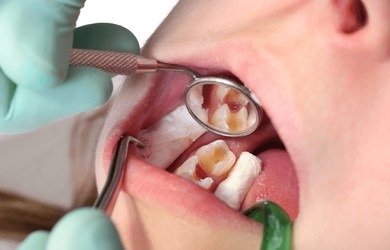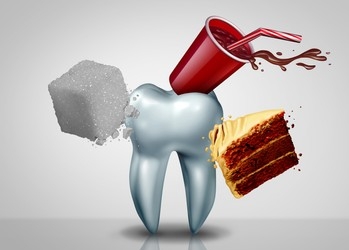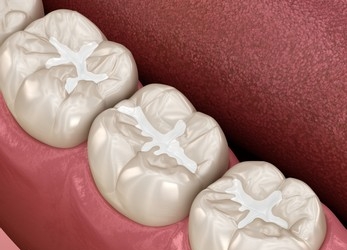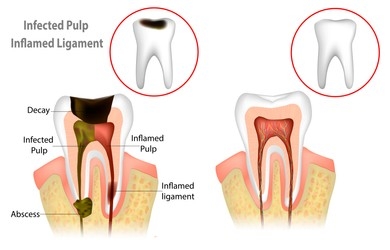What is a cavity?
Tooth decay (cavities), a common dental problem that affects individuals of all age groups, occurs when acids produced by bacteria gradually erode the protective layer of tooth enamel. Learning about the symptoms, causes, treatment and preventative techniques of tooth decay is crucial to maintaining optimal oral health and preventing dental problems.

If tooth cavities left untreated, cavities can deepen and affect the inner layers of the tooth, causing pain and further damage. Dentists usually treat cavities by removing the decayed part of the tooth and filling the cavity with amalgam or white filling materials. Regular brushing, flossing and dental examinations are essential to prevent cavities and maintain oral health.
Symptoms of Tooth Decay
What does tooth decay start like?
Tooth decay usually starts as a gradual process and often has no obvious symptoms. Initially, it may appear as small white spots on the tooth surface, indicating demineralization of the enamel. As the decay progresses, these spots darken and the affected area becomes sensitive to changes in temperature or the consumption of sugary substances.
- Tooth Sensitivity: Increased sensitivity to hot, cold, sweet, or sour foods and drinks can indicate tooth decay.
- Toothache: Persistent or throbbing tooth pain, especially when biting down, may signify advanced decay.
- Discoloration: Dark spots or stains on the teeth may indicate decay or demineralization of the enamel.
- Visible Holes or Pits: Cavities, visible as holes or pits on the surface of the teeth, are a clear sign of tooth decay.
What causes cavities?

- Bacteria and Plaque: Harmful bacteria in the mouth produce acids that attack the enamel when combined with sugars and starches from food.
- Inadequate Oral Hygiene: Inadequate and irregular tooth brushing and flossing cause plaque accumulation and increase the risk of caries.
- Sugary and Acidic Foods: Consumption of sugary and especially glucose syrup-added snacks and acidic drinks fuels bacterial activity and tooth enamel erosion./li>
- Dry Mouth: Factors such as medications or medical conditions and decreased salivary flow due to inadequate water drinking can lead to tooth decay./li>
- Genetic Factors: Genetic factors can affect the sensitivity of tooth enamel and its susceptibility to decay.
Tooth Decay Treatment
Dental fillings

Dentists remove the decayed parts of the tooth and fill the gap with materials such as amalgam or composite resin.
How can you tell if you need a filling?
Dental fillings clean a decayed tooth, prevent tooth extraction, repair the structure of a damaged tooth and restore its function. Recognising teeth that need fillings early can help prevent tooth loss. The main indicators that you may need a dental filling are:
- If you notice that your teeth hurt or become sensitive, especially when you eat hot or cold foods or regular sugary foods, it could be a sign of decay.
- If you have noticeable pits, dark spots or discolouration on the surface of your teeth, as these are common signs of tooth decay.
- A cracked or damaged tooth may need to be filled to stop further damage and restore its shape and function.
- If food is constantly getting stuck in certain areas, it may indicate that there are cavities that need treatment or cavities that need filling.
- Constant bad breath may indicate a build-up of bacteria in cavities, which may indicate the need for a filling.
- Swelling or abscess around a particular tooth may indicate decay that needs attention.
Dental crowns
In cases of excessive decay or damage, dental crowns can be placed to restore the shape, strength and appearance of the tooth.
Root canal treatment:

If the decay reaches the pulp (nerve tissue) of the tooth, root canal treatment may be required to remove the infected tissue and save the tooth.
Tooth extraction
In severe cases where the tooth cannot be repaired, extraction may be the only option.
Fluoride treatment
Fluoride is directly applied to teeth to strengthen enamel and prevent decay. It restores minerals in acid-eroded areas and prevents further damage. At routine dental exams, dentists give fluoride treatments, and toothpaste and mouth rinses can be used at home.
Prevention of Tooth Decay
How to stop tooth decay from spreading?
- Good Oral Hygiene: Brush your teeth twice a day with fluoride toothpaste and floss to remove plaque and prevent decay.
- Balanced Nutrition: Limit sugary and acidic foods and drinks by choosing nutritious choices such as fruits, vegetables and dairy products. Be careful to consume natural products.
- Fluoride: Use fluoride toothpaste and opt for fluoride treatments to strengthen tooth enamel and prevent decay.
- Regular Dental Examinations: Schedule dental exams and cleanings every six months for early detection and treatment of cavities.
- Dental Veneers: Apply dental veneers to the chewing surfaces of molars to provide an extra layer of protection against decay.
Does tooth decay affect dental implants?
Dental implants such as All on 4 or All on 6 made of decay-resistant titanium are generally not affected by tooth decay. However, tooth decay can indirectly damage dental implants and the gums and teeth around them. Poor oral hygiene or untreated tooth decay in adjacent teeth can cause periodontal disease or bone deterioration, threatening the support system of a dental implant.
Does a decaying tooth cause bad breath?
Yes, a decaying tooth can cause bad breath.
A decaying tooth is a common source of halitosis (bad breath) due to the accumulation of bacteria in the decayed area. These bacteria release sulphur compounds that produce an unpleasant odour. Food particles trapped in cavities contribute to bacterial growth, worsening the odour and, if left untreated, can lead to more severe, complications
